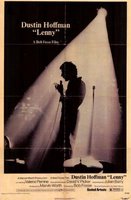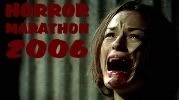
Thankfully abandoning the traditional three-act structure that plagues so many entries of the biography genre (by means of stripping down the nuances and insights of its figure of interest so as to fit them into a tidy, crowd-pleasing form), Bob Fosse’s inquisitive
Lenny never quite takes flight, although its continuous takeoff efforts are savory enough in their own right. Rather than packing the turbulent life of Lenny Bruce into traditional narrative form,
Lenny opts for a pseudo documentary approach, recreating key moments of his life, interspersed amongst retrospective “interviews” conducted with the cast members (posing as their real-life counterparts) and Hoffman’s onstage performances as the deceased comic. Lenny Bruce’s onstage antics typically involved the use of language and sexual imagery (tame by today’s standards, but horrifically obscene at the time) as a means of satirizing and commenting on American society and culture, his aim being to enlighten his audience on the injustices of the world and the power of knowledge and honesty in writing such downfalls. His means to seeking the truth earned him equal doses of fame and followers as well as copious amounts of legal trouble (those inspired by him include George Carlin and Bill Hicks, among many others), his use of swear words often landing him in court for obscenity. In many ways,
Lenny feels incomplete, never
really pinpointing the deeper aspects of its characters’ motivations or beliefs, although it’s not for lack of trying, particularly on the part of Dustin Hoffman’s bravura performance. But, in regards to its celebrity figures’ boundary-pushing humor, the film certainly does justice in attempting to deconstruct it so wholeheartedly. Few scenes in the film work better than a handful of extended takes of Bruce’s comedy act, calmly observing his thoughts and words as they unfold like a carefully controlled torrent of pathos and insight up on the stage.




 Thankfully abandoning the traditional three-act structure that plagues so many entries of the biography genre (by means of stripping down the nuances and insights of its figure of interest so as to fit them into a tidy, crowd-pleasing form), Bob Fosse’s inquisitive Lenny never quite takes flight, although its continuous takeoff efforts are savory enough in their own right. Rather than packing the turbulent life of Lenny Bruce into traditional narrative form, Lenny opts for a pseudo documentary approach, recreating key moments of his life, interspersed amongst retrospective “interviews” conducted with the cast members (posing as their real-life counterparts) and Hoffman’s onstage performances as the deceased comic. Lenny Bruce’s onstage antics typically involved the use of language and sexual imagery (tame by today’s standards, but horrifically obscene at the time) as a means of satirizing and commenting on American society and culture, his aim being to enlighten his audience on the injustices of the world and the power of knowledge and honesty in writing such downfalls. His means to seeking the truth earned him equal doses of fame and followers as well as copious amounts of legal trouble (those inspired by him include George Carlin and Bill Hicks, among many others), his use of swear words often landing him in court for obscenity. In many ways, Lenny feels incomplete, never really pinpointing the deeper aspects of its characters’ motivations or beliefs, although it’s not for lack of trying, particularly on the part of Dustin Hoffman’s bravura performance. But, in regards to its celebrity figures’ boundary-pushing humor, the film certainly does justice in attempting to deconstruct it so wholeheartedly. Few scenes in the film work better than a handful of extended takes of Bruce’s comedy act, calmly observing his thoughts and words as they unfold like a carefully controlled torrent of pathos and insight up on the stage.
Thankfully abandoning the traditional three-act structure that plagues so many entries of the biography genre (by means of stripping down the nuances and insights of its figure of interest so as to fit them into a tidy, crowd-pleasing form), Bob Fosse’s inquisitive Lenny never quite takes flight, although its continuous takeoff efforts are savory enough in their own right. Rather than packing the turbulent life of Lenny Bruce into traditional narrative form, Lenny opts for a pseudo documentary approach, recreating key moments of his life, interspersed amongst retrospective “interviews” conducted with the cast members (posing as their real-life counterparts) and Hoffman’s onstage performances as the deceased comic. Lenny Bruce’s onstage antics typically involved the use of language and sexual imagery (tame by today’s standards, but horrifically obscene at the time) as a means of satirizing and commenting on American society and culture, his aim being to enlighten his audience on the injustices of the world and the power of knowledge and honesty in writing such downfalls. His means to seeking the truth earned him equal doses of fame and followers as well as copious amounts of legal trouble (those inspired by him include George Carlin and Bill Hicks, among many others), his use of swear words often landing him in court for obscenity. In many ways, Lenny feels incomplete, never really pinpointing the deeper aspects of its characters’ motivations or beliefs, although it’s not for lack of trying, particularly on the part of Dustin Hoffman’s bravura performance. But, in regards to its celebrity figures’ boundary-pushing humor, the film certainly does justice in attempting to deconstruct it so wholeheartedly. Few scenes in the film work better than a handful of extended takes of Bruce’s comedy act, calmly observing his thoughts and words as they unfold like a carefully controlled torrent of pathos and insight up on the stage.




